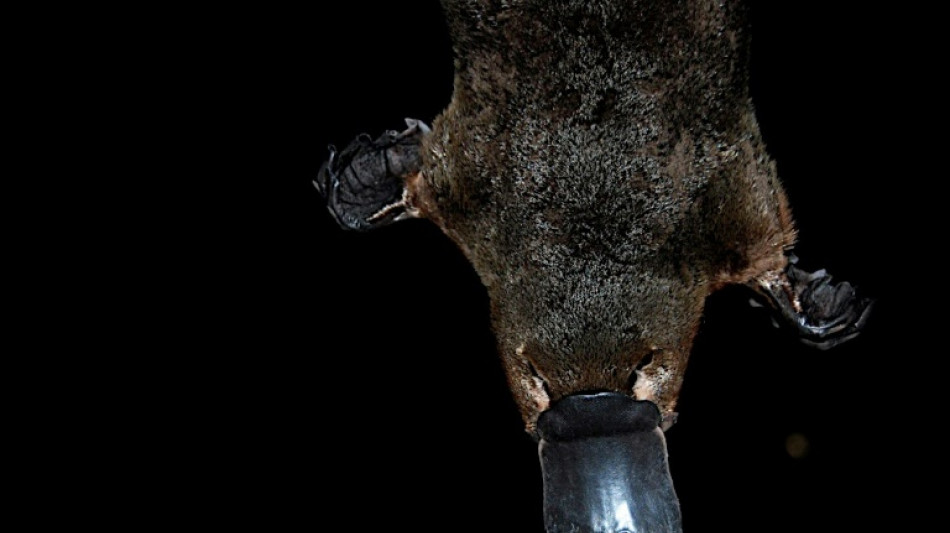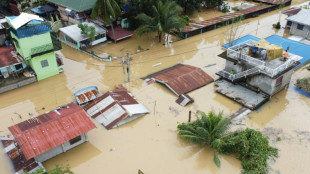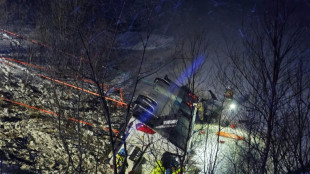
-
 Desertions spark panic, and pardons, in Ukraine's army
Desertions spark panic, and pardons, in Ukraine's army
-
China sanctions US firms over Taiwan military support

-
 Asian markets mostly rise but political turmoil holds Seoul back
Asian markets mostly rise but political turmoil holds Seoul back
-
N. Korean soldier captured in Russia-Ukraine war dies: Seoul

-
 Huthis claim new attacks on Israel after strikes hit Yemen airport
Huthis claim new attacks on Israel after strikes hit Yemen airport
-
World number six Rybakina makes winning start at United Cup

-
 South Korean lawmakers impeach acting President Han Duck-soo
South Korean lawmakers impeach acting President Han Duck-soo
-
Israeli strikes hit Yemen airport as WHO chief prepares to leave

-
 Swiatek not expecting WADA appeal over doping scandal
Swiatek not expecting WADA appeal over doping scandal
-
India lose five after Smith's heroics put Australia in charge of 4th Test

-
 'Dangerous new era': climate change spurs disaster in 2024
'Dangerous new era': climate change spurs disaster in 2024
-
Fritz motivated for Slam success after low-key off-season

-
 Move over Mercedes: Chinese cars grab Mexican market share
Move over Mercedes: Chinese cars grab Mexican market share
-
Zverev aiming to challenge Sinner for top ranking

-
 N. Korean soldier captured in Russia-Ukraine war: Seoul
N. Korean soldier captured in Russia-Ukraine war: Seoul
-
Inspired Tsitsipas looking to 'refresh, regroup' in Australia

-
 India announces state funeral for former PM Manmohan Singh
India announces state funeral for former PM Manmohan Singh
-
Seahawks edge Bears to boost NFL playoff hopes

-
 Rohit out cheaply as Smith heroics put Australia in charge of 4th India Test
Rohit out cheaply as Smith heroics put Australia in charge of 4th India Test
-
Thunder NBA win streak at nine as Shai ties career high with 45

-
 India announces state funeral for ex-PM Manmohan Singh
India announces state funeral for ex-PM Manmohan Singh
-
Japan govt approves record budget for ageing population, defence

-
 Japanese shares gain on weaker yen after Christmas break
Japanese shares gain on weaker yen after Christmas break
-
Smith's 140 puts Australia in control of 4th Test against India

-
 South Korea's acting president faces impeachment vote
South Korea's acting president faces impeachment vote
-
Fleeing Myanmar, Rohingya refugees recall horror of war

-
 Smith century puts Australia in control of 4th Test against India
Smith century puts Australia in control of 4th Test against India
-
Israeli strikes hit Yemen as Netanyahu fires warning

-
 Peru ex-official denies running Congress prostitution ring
Peru ex-official denies running Congress prostitution ring
-
Australia's Smith reaches 34th Test century

-
 NHL Red Wings fire Lalonde and name McLellan as head coach
NHL Red Wings fire Lalonde and name McLellan as head coach
-
InterContinental Hotels Group PLC Announces Transaction in Own Shares - December 27

-
 Relief Therapeutics Provides Update on Potential Transaction with Renexxion
Relief Therapeutics Provides Update on Potential Transaction with Renexxion
-
Australian bushfire burns area the size of Singapore

-
 Injured Halep withdraws from Australian Open
Injured Halep withdraws from Australian Open
-
Liverpool power seven points clear, Man Utd crash at Wolves

-
 Two killed in treacherous Sydney-Hobart yacht race
Two killed in treacherous Sydney-Hobart yacht race
-
Leaders Liverpool survive Leicester scare to go seven points clear

-
 Membership of UK's anti-immigration Reform party surpasses Conservatives
Membership of UK's anti-immigration Reform party surpasses Conservatives
-
US stocks take a breather, Asian bourses rise in post-Christmas trade

-
 Two dead in treacherous Sydney-Hobart yacht race
Two dead in treacherous Sydney-Hobart yacht race
-
Amorim warns of 'long journey' ahead for miserable Man Utd

-
 Three dead, four injured in Norway bus accident
Three dead, four injured in Norway bus accident
-
Russia missile suspected in Azerbaijani plane crash, Moscow warns against 'hypotheses'

-
 Man Utd fall to Wolves as Fernandes sees red
Man Utd fall to Wolves as Fernandes sees red
-
Fernandes sent off as Man Utd crash at Wolves, troubled Man City held by Everton

-
 'Logical' that fatigued Spurs are faltering - Postecoglou
'Logical' that fatigued Spurs are faltering - Postecoglou
-
Manmohan Singh: technocrat who became India's accidental PM

-
 Panama president rules out talks with Trump over canal threat
Panama president rules out talks with Trump over canal threat
-
India's former PM Manmohan Singh dies aged 92


Australia's 'irreplaceable' platypus threatened by dams: study
The future of the platypus, a unique duck-billed, egg-laying mammal only found in Australia, is under threat because they cannot climb over tall river dams, according to a new study.
The platypus is an oddity in many ways. As well as its duck-like bill and egg-laying, it is a rare venomous mammal, brandishing centimetre-long poisonous spurs on its hind legs.
They are also one of the only mammals who can locate prey by detecting electric fields and whose fur glows blue-green under an ultraviolet light. Platypuses even have 10 sex chromosomes -- most mammals have two.
But the number of platypuses has fallen by 50 percent since Europeans settled Australia more than two centuries ago, according to previous research.
Its habitat has increasingly come under threat from climate change-fuelled extreme weather events including drought and fire. They are also preyed upon by invasive species such as foxes, cats and dogs.
A new study published in the journal Communications Biology this week identified a new threat: platypuses are not able to climb over large, human-madedams in rivers.
The study's lead author, Jose Luis Mijangos of the University of New South Wales, told AFP that "there might be as few as 30,000 mature platypuses" left in Australia.
More than three quarters of Australia's dams measuring over 10 metres (33 feet) are in regions where platypuses live, the study said.
Some platypuses, which mostly live in rivers and streams but can use their webbed feet to walk on land, have been reported to be able to cross smaller dams.
But they cannot get over taller dams, isolating the animals from each other, the study found.
- Increased inbreeding -
The researchers took the DNA samples of 274 platypuses from nine rivers in the states of Victoria and New South Wales. Five of the rivers have dams between 85 to 180 metres tall, while the others flow unimpeded.
Comparing the samples, they found that genetic differences were four to 20 times higher in platypus populations around the dammed rivers compared to those not living near dams, indicating the first group rarely mixed with others.
They also estimated that the genetic differences had increased in every platypus generation since the nearby dams had been completed.
"These results suggest that almost no or no platypuses have passed around the dams since they were built," Mijangos said.
As a result, "populations are fragmented, which means that the ability to recolonise available habitat or migrate to areas with more suitable conditions is restricted," he added.
"Fragmentation also simultaneously reduces both local population size and gene flow, each of which is expected to lead to increased inbreeding and reduction of the genetic variation."
To address the problem, the researchers propose structures be built to help the platypuses scale the dams. They also suggested that humans could relocate some platypuses to promote diversity.
After all, the platypus is too weird to be lost.
"Platypuses are arguably the most irreplaceable mammal because they have a unique combination of features," Mijangos said.
Y.Kobayashi--AMWN



